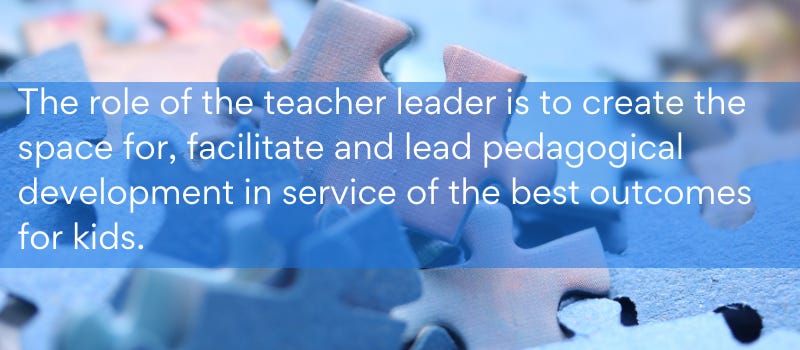“[Middle Leaders] are experiencing increasing pressure and increasing diversity of role throughout the school.” (Glover et al 1998)
It’s not new news, is it? Only that now, the complexity of the world, a generation later, has gone up a notch or two.
In all of the growing demand on the middle layer of leadership now arrives from so many more directions, not the least being from the business dimension of running a school, seen especially in the explosion of the international schools game.
Mission Impossible?
I think we have, to a large degree, lost sight of the true and moral purpose of teacher teams in school, as we have the most impactful role that the leaders of these teams should have.
Here is my strong belief and conviction, and I’m up for this being tested and challenged:
The singular mission of a teacher team is to constantly strive for teaching and learning development in service of the best outcomes for students possible.
Not the plethora of administrative, operational or business related tasks often thrust on teacher teams. I admit that expecting a singular focus on this mission may not be realistic in the day-to-day school life, but hopefully, you get my point.
If this mission is agreed upon, even desirable, then some questions follow.
Will an analysis of the agendas of the teacher teams in your school reflect high prioritization towards this mission?
Is this mission explicit in your school and teams? Is it a constant part of the narrative?
My strong suspicion that in too many schools, teacher teams are not laser focused on a constant pedagogical improvement agenda. I have worked in schools for over 40 years now, and the wide variety of experiences I have had along with the significant numbers of schools I have visited, I have struggled to find many challenges to this often unspoken issue. Do you agree, or am I off the mark?
If this is at least generally accepted, then there are some subsequent issues to address.
The Role Of The Senior Leader
Addressing this central problem in schools can only really begin with senior leadership. Once the senior leaders in a school accept this mission, it naturally leads to a focus on optimizing how teacher teams and their leaders operate at every level. The Why, How and What of teacher teams needs review. Creating the space and resources to incubate this teacher teams mission also follows.
The Role Of The Teacher Leader
Now we get to one of my primary drivers and passions. Once we accept the central mission of teacher teams, the role of the teacher leader becomes very clear.
The role of the teacher leader is to create the space for, facilitate and lead pedagogical development in their team, in service of the best outcomes for kids.
This, then, demands a particular skill set, and mindset, often not intentionally identified, addressed or developed. This development gap has been further exacerbated by a growing global teacher shortage that is resulting in younger teacher leaders.
So what skills might a teacher leader need to masterfully lead team learning in this context? Here is my attempt:
Facilitation Skills: The ability to moderate discussions, ensure everyone's voices are heard, and guide the group towards consensus and decision-making. This leader should be skilled in employing various strategies to engage the team and drive meaningful conversations.
Listening Skills: A good leader of learning must also be a good listener. They should be adept at understanding and summarizing others' ideas, clarifying confusions, and identifying commonalities or disagreements.
Conflict Management Skills: Disagreements and conflicts are common (even desirable) in team settings. A teacher leader should be able to address these constructively, maintaining respect and fairness, and finding forward motion that the team can agree upon.
Questioning Skills: The ability to ask thought-provoking and open-ended questions can help to stimulate discussion and deeper thinking, encouraging team members to learn from each other rather than relying on a single 'expert'.
Feedback Skills: The ability to give and receive feedback effectively is key for continuous improvement. Teacher leaders should help to create a culture where constructive feedback is ‘permissioned’ and used for growth.
Collaborative Learning Techniques: Familiarity with methodologies such as group activities, peer instruction, and project-based learning can help a teacher leader to foster a collaborative learning environment.
Empathy and Emotional Intelligence: Understanding and responding to the emotional needs of the team can help to create a supportive, trusting atmosphere, which is essential for effective learning.
Modeling a Learning Mindset: Teacher leaders should demonstrate their own passion for learning, curiosity, and willingness to take risks. This can help to inspire a similar mindset in the team members.
Cultivating a Shared Vision: The ability to unite the team around a common goal or vision can help to give direction and purpose to the learning process.
Capacity Building: Recognizing and nurturing the diverse skills and talents within the team, and finding ways to utilize these for the benefit of the group learning.
Did you notice the absence of an often expected dimension? A teacher leader, indeed any leader, that positions themselves as “The Expert” will struggle with many of the above dimensions. Such leaders are often less in service of the team development but more aligned to their own set of development beliefs.
It goes further. There are dispositions and mindsets needed to support the above capabilities:
Growth Mindset: Belief in the capacity of oneself and others to grow and learn. This mindset fosters resilience, encourages risk-taking, and supports continuous learning, essential for facilitating and partaking in team learning scenarios.
Collaborative Disposition: A fundamental belief in the power of collaboration and shared decision making. This disposition recognizes that collective intelligence often surpasses individual expertise, and values the diverse perspectives each team member brings.
Servant Leadership Mindset: The idea that the role of a leader is primarily to serve their team, facilitating their growth and success. This mindset prioritizes the needs of the team and creates an environment of trust and mutual respect.
Inquiry Mindset: A natural curiosity and desire to understand. Leaders with this mindset ask probing questions, foster a culture of inquiry within their team, and encourage members to learn from each other.
Adaptive Disposition: A flexible and open-minded approach that is willing to adapt to new information or changing circumstances. This disposition supports creativity, innovation, and problem-solving, and is crucial in a learning environment where new insights and understandings are continuously emerging.
In my coming posts, I am going to isolate some of these capabilities and dispositions in some case studies to further add sense and meaning-making for you. This journey will also offer strategies, models and tools in service of supporting our middle leaders in schools.
To summarise the big picture:
Teacher Teams have a prime and overarching mission
Teacher Leaders have a unique and (in the context of this mission) under-developed capabilities and dispositions
A great deal more needs to be done to fully support and develop or educational middle leaders
What are your thoughts?
If you want a PDF copy of a diagnostic, where you can rate each capability and disposition above, subscribe and I’ll personally email you this document.




